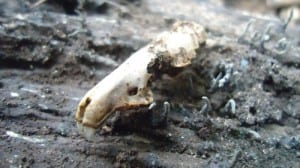By Kevin Hutchings, University of Northern British Columbia
The Pacific Ancient and Modern Language Association (PAMLA) held its 111th annual conference at the Bahia Resort Hotel in San Diego, California, in early November, 2013. In my role as ASLE’s liaison to PAMLA, I had the pleasure of organizing two ASLE-sponsored Ecocriticism panels. This was the third year in a row that ASLE was represented at PAMLA’s annual conference, and both panels were well attended. As usual, I introduced each session by plugging the benefits of ASLE membership, discussing our biennial conferences and symposia, and encouraging folks to consider submitting their work to ISLE.
 Our first Ecocriticism panel highlighted the speakers’ shared interest in the representation of animals and human-animal relationships. Starting things off, Holly Henry (California State, San Bernardino) considered the status of non-human primates in evolutionary theory. Drawing on sources ranging from Sophocles to Frans de Waal, she showed how, for primates and humans, the moral virtues of cooperation, empathy, and fairness are rooted in shared evolutionary processes. Kurt Fosso (Lewis and Clark College) followed with a presentation of Wordsworth’s little-known poem “Peter Bell,” exploring its discourse on our moral obligations to animals, and unpacking Wordsworth’s deconstructive notion of “the animal within” the human. Next, Scott Riley (St. Mary’s College of California) considered John Haines’s response to Robinson Jeffers’ concept of “inhumanism,” which challenges notions of human separation from, and mastery over, animals. Finally, Dee Horne (Northern British Columbia) examined Mary Oliver’s depictions of birds, showing how Oliver’s poetics “ornithologize humans” in a manner highlighting the “interpenetration of the natural and the human.”
Our first Ecocriticism panel highlighted the speakers’ shared interest in the representation of animals and human-animal relationships. Starting things off, Holly Henry (California State, San Bernardino) considered the status of non-human primates in evolutionary theory. Drawing on sources ranging from Sophocles to Frans de Waal, she showed how, for primates and humans, the moral virtues of cooperation, empathy, and fairness are rooted in shared evolutionary processes. Kurt Fosso (Lewis and Clark College) followed with a presentation of Wordsworth’s little-known poem “Peter Bell,” exploring its discourse on our moral obligations to animals, and unpacking Wordsworth’s deconstructive notion of “the animal within” the human. Next, Scott Riley (St. Mary’s College of California) considered John Haines’s response to Robinson Jeffers’ concept of “inhumanism,” which challenges notions of human separation from, and mastery over, animals. Finally, Dee Horne (Northern British Columbia) examined Mary Oliver’s depictions of birds, showing how Oliver’s poetics “ornithologize humans” in a manner highlighting the “interpenetration of the natural and the human.”
While the second Ecocriticism panel covered a diverse international array of literary and cultural texts, each speaker examined issues surrounding the representation and use of water. Cecilia Cavanaugh (Chestnut Hill College) began with an ecofeminist investigation of water imagery in Spanish dramatist Federico García Lorca’s Yerma , showing how the eponymous heroine’s efforts to free herself from an oppressive marriage are allegorized according to differing attitudes toward nature and contrasting depictions of water. Next, Marguerite Nguyen (Wesleyan University) considered oceanic Vietnamese-American works in which water and water motifs figure prominently; in the process, she demonstrated how her texts’ focus on the Pacific challenges common ideas of America as a terrestrial and Atlantic-world nation. In the following paper, Andrew Wallis (Whittier College) examined the seemingly contradictory role of French novelist Jean Giono, a self- professed anti-industrialist, in supporting the construction of a controversial French hydro-electric dam by promoting a state-financed propagandistic film entitled Eau Vive . In the panel’s concluding presentation, Ilaria Tabusso Marcyan (California, San Diego) considered Delhi-based author Vandana Shiva’s efforts to stop multinational agro-businesses from patenting seeds and privatizing water, concluding with a discussion of San Diego’s New Roots Community Garden as a local experiment in food security, social justice, and urban reconnection to the land.
Because of the high quality of the papers and of the question period that followed each panel, PAMLA 2013’s ASLE-sponsored Ecocriticism panels were a considerable success. PAMLA 2014, which will be held October 31-November 2, 2014, at the Riverside Convention Center in Riverside, California, will give us an opportunity to keep the momentum going. Towards that end, I invite all ASLE members to consider submitting a proposal for next year’s ASLE-sponsored Ecocriticism panels. And please consider serving in the rewarding role of PAMLA liaison to ASLE, see the description below. The Call for Papers will be posted soon at www.pamla.org.
